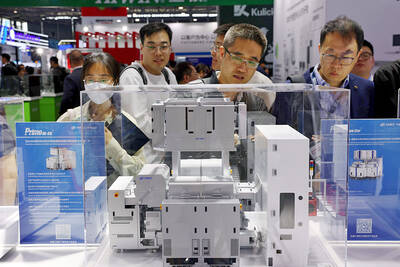A California businessman was sentenced to 15 years in prison on Thursday for stealing DuPont trade secrets to help a state-owned Chinese company develop a white pigment used in a wide range of products.
A jury earlier this year found Walter Liew (劉元軒) guilty on over 20 criminal counts, including conspiracy to commit economic espionage and trade secret theft. The government had requested a sentence of between 17.5 years and 22 years. Attorneys for Liew, 56, argued he should receive a maximum of eight years.
The US has identified industrial spying as a significant and growing threat to the nation’s prosperity. Prosecutors also charged Pangang Group (攀鋼集團), a steel manufacturer in Sichuan Province, in the Liew case, but that indictment stalled after a US judge ruled that prosecutors’ attempts to notify the Chinese company of the charges were legally insufficient.
At Thursday’s sentencing, US District Judge Jeffrey White said Liew “turned against his adopted country for greed,” adding that a “loud message” must be sent to those looking to steal from US companies.
An attorney for Liew, Stuart Gasner, declined to comment outside court. However, during the hearing, he argued that Liew’s sentence should be limited because the trade secrets at issue were not very valuable to DuPont.
Liew, in custody since the jury returned its verdict, apologized for his actions for what a government lawyer said was the first time.
“I feel terrible about it,” Liew said.
At trial, US prosecutors said Liew met with Chinese officials who directed him to seek technologies that could help the country. He then paid former DuPont employees to reveal trade secrets to help Pangang Group develop a white pigment called chloride-route titanium dioxide the government argued. The pigment is used to make a variety of white-tinted products, including paper, paint and plastics.
Pangang paid Liew’s company US$28 million, according to prosecutors. White ordered that amount of money forfeited to the government, and fined Liew’s company, an engineering consulting firm, about US$19 million.
The judge acknowledged that Liew fought his way out of poverty and was a loving father. However, White said the businessman embarked on “a virtual white-collar crime spree.”

With this year’s Semicon Taiwan trade show set to kick off on Wednesday, market attention has turned to the mass production of advanced packaging technologies and capacity expansion in Taiwan and the US. With traditional scaling reaching physical limits, heterogeneous integration and packaging technologies have emerged as key solutions. Surging demand for artificial intelligence (AI), high-performance computing (HPC) and high-bandwidth memory (HBM) chips has put technologies such as chip-on-wafer-on-substrate (CoWoS), integrated fan-out (InFO), system on integrated chips (SoIC), 3D IC and fan-out panel-level packaging (FOPLP) at the center of semiconductor innovation, making them a major focus at this year’s trade show, according

DEBUT: The trade show is to feature 17 national pavilions, a new high for the event, including from Canada, Costa Rica, Lithuania, Sweden and Vietnam for the first time The Semicon Taiwan trade show, which opens on Wednesday, is expected to see a new high in the number of exhibitors and visitors from around the world, said its organizer, SEMI, which has described the annual event as the “Olympics of the semiconductor industry.” SEMI, which represents companies in the electronics manufacturing and design supply chain, and touts the annual exhibition as the most influential semiconductor trade show in the world, said more than 1,200 enterprises from 56 countries are to showcase their innovations across more than 4,100 booths, and that the event could attract 100,000 visitors. This year’s event features 17

Germany is to establish its first-ever national pavilion at Semicon Taiwan, which starts tomorrow in Taipei, as the country looks to raise its profile and deepen semiconductor ties with Taiwan as global chip demand accelerates. Martin Mayer, a semiconductor investment expert at Germany Trade & Invest (GTAI), Germany’s international economic promotion agency, said before leaving for Taiwan that the nation is a crucial partner in developing Germany’s semiconductor ecosystem. Germany’s debut at the international semiconductor exhibition in Taipei aims to “show presence” and signal its commitment to semiconductors, while building trust with Taiwanese companies, government and industry associations, he said. “The best outcome

Semiconductor equipment billings in Taiwan are expected to double this year, as manufacturers in the industry are keen to expand production to meet strong global demand for artificial intelligence applications, according to SEMI, which represents companies in the electronics manufacturing and design supply chain. Speaking at a news conference before the opening of Semicon Taiwan trade show tomorrow, SEMI director of industry research and statistics Clark Tseng (曾瑞榆) said semiconductor equipment billings in Taiwan are expected to grow by an annual 100 percent this year, beating an earlier estimate of 70 percent growth. He said that Taiwan received a boost from a